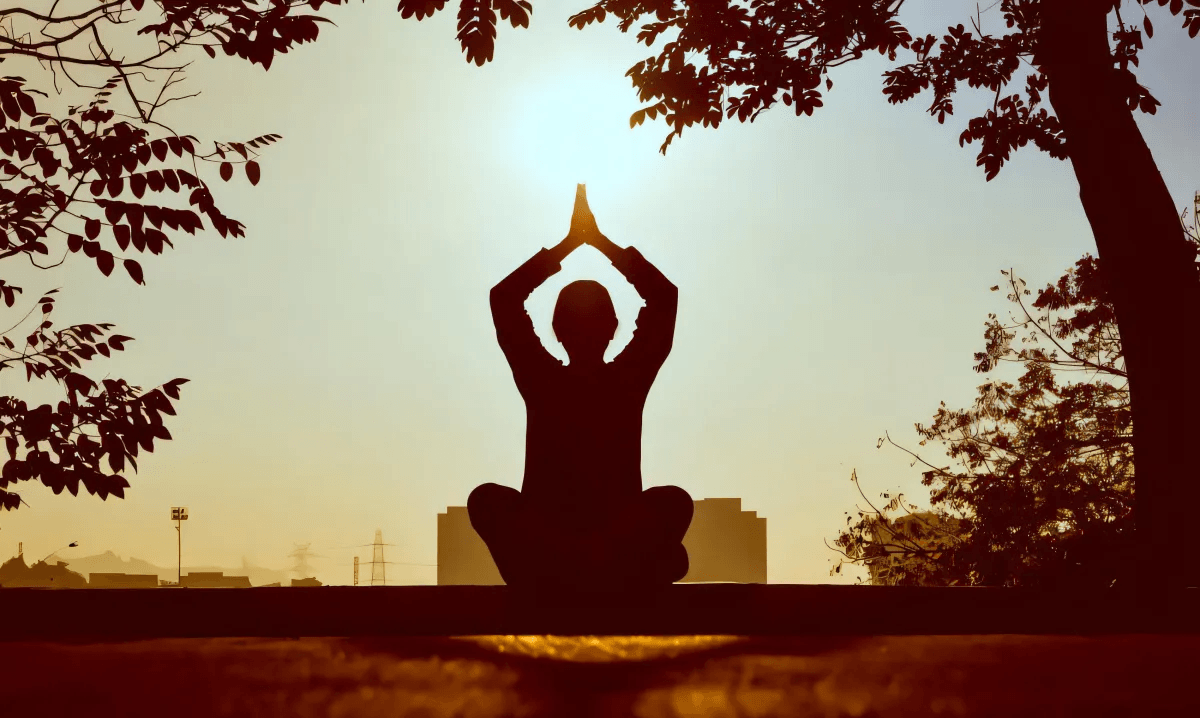Finding Yourself Through Different Types Of Meditation

Meditation is an ancient mental activity that transforms the mind, it aims to encourage a higher state of awareness, focus, and attention, preventing the mind from rushing in an aimless stream of thoughts. Meditation is a spiritual practice with attention to lead the mind into a better sense of presence, serenity, and increase the value of human qualities, empathy, and patience.
The mental activities through meditation are meant to learn how to work with the mind, focusing on one thing which can be a religious practice or a way of reaching peace of mind and positivity. To have control over our actions, and consequently how we react to situations, we need to cultivate mind awareness, and the ability to focus. There is no better way to do this than meditation.
Taking charge of our mind doesn't necessarily mean controlling it, what it actually means is to allow ourselves to connect with the mind's innate qualities, such as spaciousness, goodness, creativity, virtue, and many more, to let the mind break free from confusion and negativity.
According to Buddhism, meditation is the only and real cure for all the negativity that destroys your personal inner world, which leads to the general confusion of the human condition. Meditation besets this condition, through practices and techniques that develop concentration, clarity, positivity, and in addition, looking at things in a peaceful way for what they truly are.
Through particular practices of meditation, you learn about your mind, its patterns, and habits, replacing your bad habits with more positive ways of being. Through meditation, you have greater control over your mind which leads to action. When you reach a focused state of mind, this experience can guide you to a new meaning of life.
Different Types of meditation practices
There are countless forms of meditation. Meditation is part of every religious practice. Each form of meditation has its own value for addressing certain problems. Meditation was spread from East Asia to the Western World helping many people to find the meaning of their lives. Meditation is usually divided into two categories: Focused Attention and Open Monitoring, however, there is another category, the third one, Effortless Presence.
Focused attention meditation
Focused attention meditation aims to focus your whole attention on one single object. It may be your breath, a mantra, part of the body, an external object, etc. By making progress, the attention of the practitioner and his ability to stay focused and keep the flow of attention in one object gets stronger, whereas the distractions become weaker and weaker.
This way you develop in-depth and steadiness of attention. To enumerate some examples of this kind of meditation are Buddhist meditation, some form of Zazen, Loving-Kindness Meditation, Chakra Meditation, and many more.
Open monitoring meditation
Open monitoring meditation is the opposite of focused attention meditation. Instead of focusing on one object, you pay attention to all aspects of experience without judgment and attachment.
Your inner perceptions, thoughts, feelings, memories, etc and external such as smell, sound, are recognized and seen for what they truly are. This is a practice of continuous non-reactive monitoring of the content of the experience without going into them, for instance, mindful meditation, Vipassana, and some types of Taoist meditation.
Effortless Presence
Effortless presence meditation means not focusing your attention on anything in particular. Just relaxing on itself - quiet, empty, steady, and introverted. It is the real purpose of all forms of meditation and not a meditation type by itself.
All types of meditation with their techniques accept that the object of focus and monitoring is a tool to train the mind, to discover effortless inner peace and a deeper state of consciousness. In this case, the object of focus and the process are left behind, it remains only the true self of the practitioner, as "pure presence."
Buddhist Meditation Techniques

Zen Meditation (Zazen)
Zen meditation is "seated meditation," in the Japanese language. It dates from Chinese zen Buddhism (chan) tradition, with its origin back to an Indian monk, Bodhidharma since the 6th-century CE. Whereas in the western world, the most spread form of this kind of meditation comes from Dogen Zenji (1200-1253), who founded the Soto Zen movement in Japan. Similar forms are practiced in Japan and Korea.
Vipassana Meditation
Vipassana meditation means "insight" or "clear seeing", and it is a Buddhist practice dating since the 6th century BC. This form of meditation comes from the Theravada Buddhist tradition and gained popularity thanks to S.N. Goenka and Vipassana movement. It is the most widely spread form of meditation in the west.
Mindful meditation
Mindful meditation traces from the traditional Buddhist practices, especially Vipassana, however, it is also influenced by Zen Buddhism by Thich That Hanh. Mindful means "Sati Anapanasati," or "mindfulness of breathing", being part of Vipassana or insight meditation and other Buddhist meditation practices. John Kabat-Zinn is the main influencer who developed his Mindfulness-Based stress reduction program in 1979, at the University of Massachusetts Medical School, and it has been used in hospitals and health clinics.
Loving Kindness Meditation (Meta Meditation)
Loving-kindness meditation (Metta Meditation) means kindness, benevolence, and goodwill. It comes from the Buddhist tradition of Theravada and Tibetian roots. This form of meditation is a today scientific field that shows the efficacy of Metta and other related meditation practices. Its benefits are numerous indeed, such as empathy with others, positive emotions, compassion, more love for others, self-acceptance, greater competence, feeling about life and its purpose.
Hindu meditation techniques

There are four main types of Hindu meditation, Transcendental Meditation, (TM), Mantra meditation. (OM meditation), Yoga Meditation, and Self-Inquiry, and "I am" Meditation.
Transcendental Meditation (TM)
Transcendental Meditation (TM) is a specific mantra Meditation introduced by Maharishi Mahesh Yogi in 1955. There are more than five million people across the world who practice this form of meditation. There has been conducted scientific research, sponsored by the organization showing the benefits of this practice, on the other hand, there are critics who are against it.
Mantra meditation (OM meditation)
Mantra meditation (OM meditation) is repeating a word, (this word is the mantra) for the purpose to focus his mind. Its aim is not to convince you about something. Some teachers insist that the word and its pronunciation are significant due to the "vibration" related to the sound and meaning, with this intention, initiation into it is crucial.
Others claim that the mantra is only a tool to stay focused, its choice is absolutely irrelevant. Mantras are used in many categories of meditation, including Hindu, Buddhist, Jainism, Sikhism, and Daoism (Taoism). Some people call mantra meditation "om meditation", but this is just a Mantra. Japa is a devotion-oriented practice that consists of repeating sacred sounds (name of God) with love.
Yoga Meditation
Yoga meditation comes in many forms and types, in reality, there are several meditation categories taught in the yoga tradition. Yoga means "union" and it dates since 1700 B.C. The main goal of this type of meditation is to purify the soul and reach self-knowledge. Yoga has rules of conduct (Yamas and Niyamas) physical posture (asanas), breathing exercises (pranayama), and contemplative practice of meditation (pratyahara, Dharana, dhyana, samadhi).
Self-Inquiry and "I Am" Meditation
Self-Inquiry and "I Am" Meditation is Atma vichara, which means to "investigate" ourselves, our true nature, and the perplexing answer of "Who am I?" It reaches the climax with intimate knowledge of our true self, our true being. There are references in very ancient scriptures, however, it became popular in the 20th century by the Indian sage Ramana Maharshi (1879-1950).
Chinese meditation techniques

The technique of Taoist meditation
Taoist meditation is an action with no aim, meandering without any prefabricated notion or technique. During this form of meditation, the nature of existence is called meditation of the universe.
Taoist meditation is an ancient practice dating from the religion and philosophy of Taoism. Its methods are concentration, mindfulness, contemplation, and visualization. In the same way, its purpose is to carry the meditator into synchronization with the Source of Life.
This practice has stronger prominence to healing, energy flow, breathing technique, contemplation, and visualization. The goal is to quieten the mind and body, unify body and spirit, as a result, finding inner peace. Their aspects go deeper, people who practice join with the power of the universe to gain a deeper insight into the enlightenment. '
Qigong meditation
Qigong meditation is another form of meditation that includes controlled breathing, movement exercises, and healing techniques. The word "Qi" doesn't have a proper translation, actually, it is a concept based on traditional Chinese culture whose connotation is vital energy, information, breath, or spirit. The second word "gong" means cultivation or mastery. So Qigong is "vital energy cultivation" or "mastery of your energy."
Christian meditation

As per Christian meditation, it originates from the Bible, where believers have to meditate upon the word of God all the time to obey Him (Joshua 1:8). In addition to that, the psalmist says, "his delight is in the law of Lord, and in His law, he meditates day and night (psalm 1:2).
Meditation is mentioned 20 times in the Bible. In the Hebrew language the words for meditation are "Haga", which means to utter, meditate, or ponder; and "Sihach," which means to muse, rehearse in one's mind, or contemplate. Some other meanings of these words are dwell, diligently consider and heed.
Meditations in Christian history dates since the 4th century AD, and it is called "lector divine." It has been used in monasteries and revived today. Lectio divine means "sacred reading" and it consists of four stages: "Lectio" (reading), "meditation" (discursive meditation), "ratio," (effective prayer), and "contemplation" (contemplation).
During the reading, the believer finds a passage he is interested in and he intentionally reads it. After that, during meditation, or discursive meditation he ponders upon the text. In "ratio," which is an effective prayer he directs to God about the text, asking Him to reveal the truth, whereas in the last stage, "contemplate" (contemplation), the believer simply rests in the Lord's presence.
Christian leaders say about meditation is crucial. It is very important to think over the word of God because actions are predetermined by our thoughts. As a matter of fact, God asks us to meditate upon His Word. Jim Downing in Meditation says God considers meditation a "vital exercise of the minds of His children."
Rick Warren in his book "The Purpose of Driven Life," defines meditation as "Meditation is focused thinking. It takes serious effort. You select a verse and reflect on it over and over in your mind... if you know how to worry, you already know how to meditate."
Warren continues, "No other habit can do more to transform your life and make you more like Jesus than daily reflection on scripture... If you look up all the times God speaks about meditation in the Bible, you will be amazed at the benefits He has promised to those who take the time to reflect on His Word through the day."
Dr. Bruce Demarest writes, "A quieted heart is our best preparation for all this work of God... Meditation refocuses us from ourselves and the world so that we reflect on God's Word, His nature, His abilities, and His works... So we playfully ponder, muse, and 'chew' the words of Scripture... the goal is simply to permit the Holy Spirit to activate the life-giving Word of God."
Meditation in Islam

As per meditation in Islam, it is the core of Islamic spirituality, but it doesn't get the attention and importance it deserves. Meditation means to surrender completely to the will of Allah in a conscious state of mind. When surrendering to meditation, the believers let go of their ego and realize they are not in control. They are practicing "mindfulness."
Justin Parrot defines mindfulness as "the quality of the state of being conscious or aware of something, and more specifically, a mental state achieved by focusing one's awareness on the present moment, while peacefully acknowledging and accepting one's feelings, thoughts, and bodily sensations, used as a therapeutic technique."
The purpose of meditation is to find satisfaction and fulfillment. All types of meditations in Islam revolve around remembering Allah, whose main goal of all this is to purify the heart from evil feelings and the mind from evil thoughts.
Reflection
Reflection in Islam means to think intentionally, constructively, purposefully, and positively. This practice is essential because the modern culture encourages instant entertainment and distraction, leaving us no time to reflect and ponder, which leads us to unresolved thoughts, ideas, fears, and beliefs. All these, on the other hand, would lead us to more stress, anxiety, and lack of inner peace, so we need to break free from this world.
Close your eyes and bear in mind that Allah is watching you. He is nearer than the jugular vein, constantly. Reflect upon the fact that God is aware of your worries, fears, hopes, and dreams.
You don't need to say anything or being hard on yourself, all you need is to clear negative thoughts debasing yourself. Your focus should be Allah, nothing else. Every day you can increase the time little by little to master this technique, for the most part, reflect upon Allah and bring awareness to help you become more grateful and decrease life stress.
Gratitude
Gratitude doesn't mean to be grateful only by word of mouth. What we need is to consciously cement it daily. Umar ibn Abdul Aziz said, "Speaking in remembrance of Allah Almighty is good and thinking about His Blessings is the best act of worship."
Seclusion
Seclusion is something prophet Muhammad used to do before prophethood. During those circumstances, he spent days in the Cave of Hira to understand the reality and everything that happened in the society he lived. Breaking away from all daily activities and everybody we deal with, focusing only on God, is a balm for the soul consequently the silent mindfulness will increase and improve concentration during prayer, and many other acts of worship.
Dhikr
Dhikr is another form of meditation in Islam, which consists of repeating words to worship Allah.
Quran Recitation
Reading the Qur'an (or reciting it) is considered another form of meditation with great importance. If you experience difficulties during your daily activities then the Qur'an is a remembrance for this reason it is a source of positive energy. The purpose of this form of meditation is to improve our acts of worshiping God, to lead a balanced spiritual life.
Fahmida Zeidan, the founder of Yan Taru Learning Centre, says, "the core principle of meditation practices is realizing that whatever comes your way is coming from Allah, and therefore you have nothing to fear. Meditation gives you the ability to face the world and whatever it throws at you."
Sufi Meditation
Sufi meditation is a mystic movement within Islam, whose aim is to purify oneself and reach mystical unison with Allah. There is a wide range of spiritual practices, some of which were influenced by Yoga in India. This form of meditation is spiritual by nature.
They believe the idea of faith in God is part of DNA, all their meditation practices focus on remembering God, and fill your heart with God, uniting yourself with Him. For this reason, atheists and agnostics do not find themselves in these practices.
This is a lifetime journey going back into the arms of the beloved. It is a journey of love where we let our egos die to be one with Him. What this forms of mediation focus on is to let go of the ego, the greatest obstacle to realization. Sufis live simultaneously in the inner world of the heart and are a responsible part of society.
Guided meditations

Guided meditations are a modern phenomenon, a simple way to begin, and are based on most of the above-listed traditions. It requires from the meditator determination and strong willpower. Motivation had made people of the past more committed moreover, they had strong ideas to encourage their motivation.
They lived a simple life with very few distractions, while today our life is busier, full of distractions, and meditation is considered a tool to improve health, enhance performance, or improve oneself. Guided meditations are a perfect way to lead you into the practice of meditation, try different techniques, or just simply keep your attention more present during the process of meditation.
How to meditate
Meditation is a complex process, hard and simple at the same time. Not all forms of meditation are the same, some differ from one another, but basically, the most general way of meditation that all categories have something in common is like this:
- Find a quiet place to sit with no distractions, peaceful.
- There must be a time limit, if you are a beginner, choose a short time, 5-10 minutes.
- Notice your body, sit on a chair with feet on the floor, or loosely cross-legged, or you can kneel. Just find a stable position you can stay for a while
- Feel your breath. While your breath, pay attention and follow the sensations while it goes in and goes out.
- Pay attention to the wandering mind. When you notice this, - in a few seconds, a minute, or five minutes - return your attention to the breath.
- Try to understand your wandering mind, don't judge it, or become obsessed over your thoughts, you will find yourself lost in. Just come back.
- Finish with kindness. When you're gone, lift your gaze or open your eyes if they are closed. Pay attention to any sounds in the environment, notice your body and how it feels at this moment, notice your thoughts and what you feel.
- That is it! You finish and come back again, do it with kindness, as much as you can.
The Benefits of Meditation
The purpose of meditation is to give you a sense of peacefulness, serenity, and equilibrium for the benefit of emotional well-being and overall health. As per research conducted by Mayoclinic, it shows how meditation benefits last for a longer time beyond the session, carrying you with serenity throughout the day and aid you to manage symptoms of certain medical conditions.
Meditation and emotional well-being
During the meditation process, you clean up your mind from the unnecessary overload of information that stresses you out.
The emotional benefits of meditation:
- Giving you a new way to approach stressful situations
- Developing new skills to handle stress
- Increase self-awareness
- Living in the moment
- Reducing negativity
- Developing imagination and creativity
- Developing patience and tolerance.
Meditation and illnesses
Meditation can be applied in medicine, some scientists believe it is too early to come up with these conclusions, while other researchers suggest that meditation may help people manage symptoms of conditions such as:
- Anxiety
- Asthma
- Cancer
- Chronic pain
- Depression
- Heart disease
- High blood pressure
- Sleep problems
- Tension headaches
- Addiction
Before you apply meditation as a way to help your general wellbeing, especially if you have one or some of these symptoms, you must consult your caregiver. There are cases when meditation can worsen the symptoms with certain mental and physical health conditions. Meditation is not meant to replace medical treatment, but to be an additional help.
Real-life examples of how meditation has helped people.
"There are thousands of techniques, and different ones work for different people. I'd tried a few but really was relaxing, not meditating, but when I got to the body-based techniques, I'd finally found a counterpoint to having lived in my head. The body techniques like Vipassana often work well for type A's because high performers tend to live in their heads. I tried ten days of body technique, and by the end of it, I decided to change my life and use technology to spread the benefits of meditation to everyone." - Nichol, San Francisco, California
"I started meditation about eight years ago because work-related stress was causing me to have anxiety attacks. I just couldn't calm down, and based on some google research it seemed like meditation was worth a try.
While I don't believe meditation is a quick-fix solution for anxiety and stress, I can truly say that meditation has changed the way I approach to stress and negative situations. I feel so much more well equipped to handle the negative parts of life. Meditation teaches you to just accept what is. The more you fight these natural parts of life, actually the harder it is to let them go.
I continue to meditate frequently, often daily, as it is a practice that brings me peace, and I recommend it to many people." Kim Hefner, Wild, and Found Photograph.
In the ancient Veda texts, meditation is described as an exercise of consciousness that leads to the broadening of consciousness beyond what we experience everyday duality. Through meditation you experience harmony, reducing stress, increase creativity, and effectiveness of your inner faculties. It happens without the supervision of the mind.
The meditation achieves its results automatically, not by controlling, on the contrary, through meditation, you let go of the illusion of control or any other mental manipulation. During the process of meditation, you go beyond the mind to the deepest level of your inner Self.
References:
- All About God Staff. Christian Meditation. All About God. n.d. https://www.allaboutgod.com/christian-meditation.htm
- Bheekoo-Shah, Fatima. 5 Meditation Practices in Islam. About Islam. March 01, 2020. https://aboutislam.net/family-life/self-development/5-meditation-practices-in-islam/
- Cherry, Kendra. What is Meditation? verywellmind. Reviewed by Monahan, Megan. September 01, 2020. https://www.verywellmind.com/what-is-meditation-2795927
- Dientsmann, Giovanni. The Ancient Powerful Practices of Hindu Meditation. THE WAY OF MEDITATION. May 16, 2019. https://www.thewayofmeditation.com.au/hindu-meditation
- Giovanni, Sufi Meditation and Breathing Practice. Live & Dare. n.d. https://liveanddare.com/sufi-meditation
- Giovanni. Types of Meditation - An Overview of 23 Meditation Techniques. Live & Dare. n.d. https://liveanddare.com/types-of-meditation/
- Holms, Katie. 49 People Comment On The Benefits Meditation Has Brought Them. OutwitTrade. Last Updated March 18, 2021. https://outwittrade.com/meditation-benefits-and-stories/#hanna
- Mayo Clinic Staff. Meditation: A simple, fast way to reduce stress. MAYO CLINIC. April 22, 2020. https://www.mayoclinic.org/tests-procedures/meditation/in-depth/meditation/art-20045858
- Mindful staff. How to Meditate. Mindful. n.d. https://www.mindful.org/how-to-meditate/#how
- Mindworks Team. Meditation Definition: What is Meditation? Take Charge of the Mind. Mindworkds. n.d. https://mindworks.org/blog/meditation-definition/
- Pajer, Nicole. Quiet the Mind and Get Your Zen on with these 50 Quotes About Meditation. Parade. April 1, 2021. https://parade.com/1066461/nicolepajer/meditation-quotes/
- Palermo, Elizabeth. What is Qigong? LIVESCIENCE. March 09, 2015. https://www.livescience.com/38192-qigong.html
- Puja Sen. What is Taoist Meditation I Technique Of Taoist Meditation. The Sound Of Silence. January 10, 2020. https://themeditationguides.com/techniques/what-is-taoist-meditation-technique-of-taoist-meditation/#What_is_Taoist_Meditation
- Sharma, Hari. Meditation: Process and effects. NCBI US National Library of Medicine National Institute of Health. n.d. https://www.ncbi.nlm.nih.gov/pmc/articles/PMC4895748/
- The Buddhist Centre. What is Meditation n.d. https://thebuddhistcentre.com/text/what-meditation
- Tigar, Lindsay. 10 People on How They Got Into Meditation. Aaptiv. n.d. https://aaptiv.com/magazine/meditation-stories
Opinions and Perspectives
Love how the article emphasizes that meditation is a practice, not a perfect science. Takes the pressure off trying to do it 'right'.
The variety of techniques described shows there's really something for everyone. Just need to find what works for you.
Really connected with the part about meditation helping develop patience. It's definitely made me more mindful in my daily interactions.
The practical tips at the end are really helpful. I'm going to try incorporating some of these into my daily routine.
I find it fascinating how different cultures developed similar practices independently. Shows how universal the need for inner peace is.
The connection between meditation and improved sleep quality is real. I've noticed such a difference in my sleep patterns since starting.
Great article, but I wish it had covered some of the potential challenges beginners might face. It took me months to develop a consistent practice.
I have! Combined with physical therapy, it's helped me manage my fibromyalgia significantly better.
The section about meditation's effects on chronic pain interests me. Anyone here used it successfully for pain management?
Never realized how many scientific studies support meditation's benefits. Makes me feel more confident about recommending it to others.
The description of different breathing techniques was helpful. I've been experimenting with different methods mentioned.
I appreciate how the article explains that meditation isn't about emptying your mind completely. That myth kept me from trying it for years.
The part about meditation improving creativity caught my eye. I've definitely noticed clearer thinking since starting.
Yes, but that's exactly when it's most important! I've learned to make time even if it's just 5 minutes.
Does anyone else find it harder to maintain a regular practice during busy times? Just when I need it most!
The Islamic meditation practices were quite enlightening. Never knew about the Cave of Hira story before.
The article could have talked more about walking meditation. That's been really helpful for me as someone who struggles sitting still.
Interesting how they mention meditation isn't about controlling the mind but about letting go. That was a game-changer for my practice.
I relate to the type A personality example in the testimonials. Body-based techniques really helped me get out of my head.
The section about guided meditations being good for beginners is so true. It helped me build confidence before trying other methods.
I'm impressed by how meditation has been adapted for modern life while keeping its core principles intact.
Anyone else notice how the article emphasizes the importance of consistency over length of practice? That really helped me stop feeling guilty about short sessions.
The bit about meditation improving emotional well-being is spot on. I'm much better at handling stress since I started.
Reading about Zen meditation makes me want to visit a monastery and learn properly from masters.
I think the key point is that it's meant to complement medical treatment, not replace it. It's helped with my anxiety alongside therapy.
The benefits section seems a bit optimistic. I mean, can meditation really help with all those conditions?
Yes, I felt overwhelmed too! I ended up starting with guided meditations and slowly branched out from there.
Wonder if anyone else struggled with choosing between all these different techniques at first? It felt overwhelming to me.
Found the Islamic meditation section particularly interesting. The concept of surrendering to Allah through mindfulness is beautiful.
The historical background of each tradition really helps put modern meditation practices in context.
I like how the article emphasizes that different techniques work for different people. Took me trying several types before finding what clicked.
Does anyone else feel meditation has helped them become more patient? I've noticed I react less impulsively to things now.
The article could have mentioned more about group meditation benefits. I find meditating with others really powerful.
Just started meditating last week using the simple breathing technique described. It's harder than I expected but I'm sticking with it.
The part about meditation helping with creativity really resonates with me. I've noticed I get better ideas after my morning practice.
I'm curious about the Christian meditation techniques. Never thought about biblical meditation before reading this.
Yes! I do Qigong and it's amazing how different it feels from seated meditation. The energy flow is really noticeable.
The section on Qigong meditation intrigues me. Anyone here tried combining movement with meditation?
That's actually normal! The article mentions not to judge your wandering thoughts, just gently return to your breath. It gets easier with practice.
What stood out to me was how meditation can be both spiritual and secular. You can approach it from either angle and still benefit.
The comparison between focused attention and open monitoring meditation was helpful. I always mixed those up before.
I found the tips on how to meditate really practical. Starting with just 5-10 minutes made it feel less overwhelming for me.
That's a fair point about commercialization, but I think making meditation more accessible isn't necessarily a bad thing. Not everyone has access to traditional teachers.
I'm still not convinced about the whole meditation thing. Seems like it's become too commercialized lately.
As someone who practices Vipassana meditation, I can confirm it's challenging but so worth it. The insights you gain about yourself are incredible.
The part about meditation helping with chronic pain caught my attention. I've been dealing with back issues and might give it a try.
It's fascinating how meditation has evolved from ancient spiritual practices to modern stress management tools. I use a meditation app now, but I respect the traditional roots.
The real-life examples at the end really hit home. Especially the story about the person who used meditation to handle work stress. I can totally relate to that.
I appreciate how the article breaks down the three main categories. It helped me understand why some methods work better for me than others.
The section about Islamic meditation was eye-opening. I never knew about Dhikr or the spiritual aspects of Sufi meditation before.
Anyone else surprised by how many different religious traditions have their own forms of meditation? I had no idea Christianity had such deep meditation roots.
Buddhist meditation techniques seem so complex to me. I started with guided meditations and that was much easier for beginners like myself.
I tried Transcendental Meditation after reading this, but honestly found it too structured for my taste. The loving kindness meditation resonated with me much more.
Actually, I can help explain that. Think of it like watching clouds pass by. You're aware of them but not actively trying to follow or hold onto any particular cloud. That's effortless presence.
Interesting how they mention effortless presence as being the true purpose of all meditation forms. I've always struggled with that concept. How do you focus on not focusing?
The article makes some great points about different types of meditation, but I think it could have gone deeper into the scientific benefits. I'd love to see more research-backed evidence about how meditation affects brain chemistry.
I've been practicing meditation for about 6 months now and I'm amazed at how much it's helped with my anxiety. The focused attention meditation really works for me, especially when I concentrate on my breathing.
